| 1994 Miami Dolphins season | |
|---|---|
| Owner | Wayne Huizenga |
| Head coach | Don Shula |
| Home field | Joe Robbie Stadium |
| Results | |
| Record | 10–6 |
| Division place | 1st AFC East |
| Playoff finish | Won Wild Card Playoffs (vs. Chiefs) 27–17 Lost Divisional Playoffs (at Chargers) 21–22 |
| Pro Bowlers | 5
|
The 1994 Miami Dolphins season was the franchise's 29th season of existence and 25th in the National Football League (NFL). On March 23, the NFL approved the transfer of majority interest in the team from the Robbie family to Wayne Huizenga. [1] The team's playoff win on New Year's Eve 1994 vs. Kansas City is now famous as the last NFL game that Joe Montana ever played, as the superstar QB retired in the off-season.
| 1994 Miami Dolphins draft | |||||
| Round | Pick | Player | Position | College | Notes |
|---|---|---|---|---|---|
| 1 | 20 | Tim Bowens * | Defensive tackle | Ole Miss | |
| 2 | 54 | Aubrey Beavers | Linebacker | Oklahoma | |
| 2 | 60 | Tim Ruddy * | Center | Notre Dame | |
| 4 | 112 | Ronnie Woolfork | Linebacker | Colorado | |
| 5 | 147 | William Gaines | Defensive tackle | Florida | |
| 6 | 177 | Brant Boyer | Linebacker | Arizona | |
| 7 | 214 | Sean Hill | Defensive back | Montana State | |
| Made roster * Made at least one Pro Bowl during career | |||||
Front office
Head coaches
Offensive coaches
| Defensive coaches
Special teams coaches
Strength and conditioning
|
| |||||||||||||||||||||||||||||||||||||||||||||||||||||||||||||||||||||||||||||||||||||||||||||||||||||||||||||||||||
| |||||||||||||||||||||||||||||||||||||||||||||||||||||||||||||||||||||||||||||||||||||||||||||||||||||||||||||||||||
Both teams debuted new owners in Wayne Huizenga of the Dolphins and Robert Kraft of the Patriots. The game marked the return of Dan Marino after missing most of 1993 with a torn achilles tendon. The new-look Patriots took a 14–10 halftime lead, then in the third quarter Drew Bledsoe lobbed a 40-yard bomb caught by Ben Coates which he took in for a 63-yard touchdown. Marino and Bledsoe passed for eight touchdowns combined, and with the Patriots leading 35–32 Marino, on 4th and 5, launched a 35-yard touchdown strike to former Patriot Irving Fryar. The Dolphins held off New England's last-minute rally for the 39–35 win.
Marino threw two touchdown passes during his second straight win of the season as the Dolphins, playing in Milwaukee, raced to a 24–0 lead after three quarters. Brett Favre managed two touchdowns but it wasn't enough to prevent a 24–14 Dolphins win.
Marino's third straight win came at home against the Jets as he threw two touchdowns while three Dolphins backs led by Terry Kirby rushed for 155 yards and touchdowns by Kirby and Bernie Parmalee. Boomer Esiason had two touchdowns but was intercepted four times as the Dolphins won 28–14.
The Dolphins' winning streak came to a halt at the Hubert H. Humphrey Metrodome as Warren Moon lit up the Dolphins defense with three first-half touchdowns and a 28–0 Vikings lead. But the Dolphins began clawing back and in the fourth three Marino touchdowns and Bernie Parmalee's rushing score tied the game. The Vikings then added another touchdown while ex-Dolphin Fuad Reveiz booted a kick that bounced off a Dolphin and thus could be recovered by the Vikings; it led to a 38-yard field goal, enough cushion to neutralize a late Keith Byars touchdown run, ensuing onside kick, and a 38–35 Vikings win.
Dubbed the “Shula Bowl”, it marked the first time in NFL history that a head coaching matchup featured father against son. Don Shula’s Miami Dolphins defeated David Shula’s Cincinnati Bengals by a 23-7 mark, [3] to get back on track at Riverfront Stadium. After David Klingler delivered a 51-yard touchdown to Darnay Scott the Dolphins picked him off three times while rushing for 141 yards to go with 204 Marino passing yards (89 of them to Irving Fryar) and two touchdowns.
Persistent wind limited Marino and Jim Kelly to just 342 combined yards, a Marino touchdown to O.J. McDuffie, and a Kelly interception. Five Bills players led by Thurman Thomas rushed for 214 yards and two scores as the Bills beat Miami (21–11) for the 14th time in the two clubs' last 17 meetings.
Jeff Hostetler was replaced for a series by backup Vince Evans as the Raiders, despite only 227 yards of offense, forced three Miami turnovers and led 17-10 in the fourth before Keith Byars caught the tying touchdown. The Dolphins won 20-17 on Pete Stoyanovich's 29-yard field goal in overtime.
The offensive fireworks of Week One were not repeated as Dan Marino was intercepted twice but managed 198 yards and a touchdown while Bernie Parmalee accounted for almost all of Miami's 140 rushing yards and Keith Byars ran in a pair of scores. Drew Bledsoe was intercepted three times as the Dolphins won 23-3.
The Colts entered Joe Robbie Stadium beginning to build some momentum for the future, having won three of their previous five games. The Colts clawed to a 14–6 lead after three quarters but then the Dolphins began storming back on Irving Spikes' touchdown run marred by a missed two-point conversion. The Dolphins got the ball back but Marino was picked off by Ray Buchanan and he ran in a 28-yard touchdown, but despite this setback Marino whipped the Dolphins downfield and fired a 28-yard score to O.J. McDuffie, then the Dolphins got the ball back and Pete Stoyanovich's field goal finished off the 22–21 win from 34 yards out.
The Bears at 5-4 came out with a trick play on a Curtis Conway touchdown throw on a fake field goal attempt. Dan Marino was intercepted in the third but O.J. McDuffie grabbed the ball back. The Bears led 14-6 in the fourth before Marino and Irving Fryar hooked up big, leading to a Keith Jackson touchdown catch and a two-point conversion by Aaron Craver (signed back to the Dolphins only the week earlier). The Bears booted a go-ahead field goal late (17-14 score), but the Dolphins drove down field, only to see the Bears block Pete Stoyanovich's kick at the end.
Pittsburgh-born Marino's bomb to Fryar set up a first-quarter Keith Jackson touchdown, but Mike Tomczak erupted to 343 passing yards in a battle of field goals (four in regulation with a fatal miss by Stoyanovich in the second). The Dolphins tied the game, but in overtime the Steelers on a 39-yarder from Gary Anderson.
| Period | 1 | 2 | 3 | 4 | Total |
|---|---|---|---|---|---|
| Dolphins | 0 | 0 | 14 | 14 | 28 |
| Jets | 3 | 7 | 14 | 0 | 24 |
at Giants Stadium, East Rutherford, New Jersey
Following back-to-back losses the Dolphins appeared shellshocked as the Jets raced to a 17–0 lead. A Marino touchdown to Mark Ingram in the third was followed by Boomer Esiason's second touchdown of the game to Johnny Mitchell. But in the fourth everything changed; after a second Marino-to-Ingram score Esiason was intercepted and this led to a third Marino-to-Ingram touchdown; a series of fumbles led to another Esiason pick by J.B. Brown, and with two timeouts left the Dolphins had the ball with 2:34 left. Marino drove the Dolphins to the Jets eight-yard line; at this point Marino called out "Clock! Clock! Clock!" in anticipation of spiking the ball to stop the clock – Marino, however, had worked out a trick play and was paying attention to Ingram's matchup with rookie Jets cornerback Aaron Glenn; with Ingram understanding Marino's code signal and Marino seeing a favorable matchup, Marino motioned downward as though spiking the ball, but then zipped it toward Ingram running to the front corner of the endzone where he caught it, his fourth touchdown of the game. The stunned Jets faltered on their final drive and the Clock Play became one of the most famous finishes in NFL history.
| Team | Category | Player | Statistics |
|---|---|---|---|
| Dolphins | Passing | Dan Marino | 31/44, 359 Yds, 4 TD, 2 INT |
| Rushing | Bernie Parmalee | 8 Rush, 23 Yds | |
| Receiving | Mark Ingram | 9 Rec, 117 Yds, 4 TD | |
| Jets | Passing | Boomer Esiason | 26/41, 382 Yds, 2 TD, 3 INT |
| Rushing | Brad Baxter | 12 Rush, 41 Yds, TD | |
| Receiving | Rob Moore | 7 Rec, 124 Yds |
| Scoring summary | |||||||||||||||||||||||||||||||||||||||||||||||||||||||||||||||||||||||||||||||||||||||||||||||
|---|---|---|---|---|---|---|---|---|---|---|---|---|---|---|---|---|---|---|---|---|---|---|---|---|---|---|---|---|---|---|---|---|---|---|---|---|---|---|---|---|---|---|---|---|---|---|---|---|---|---|---|---|---|---|---|---|---|---|---|---|---|---|---|---|---|---|---|---|---|---|---|---|---|---|---|---|---|---|---|---|---|---|---|---|---|---|---|---|---|---|---|---|---|---|---|
| |||||||||||||||||||||||||||||||||||||||||||||||||||||||||||||||||||||||||||||||||||||||||||||||
Despite the stunning win the 8–4 Dolphins were facing a division race where the Bills, entering at 6–6, were still in contention and the Patriots were on a late-season roll. The Dolphins raced to a 17–7 lead on the Bills but Marino was intercepted three times and the Bills scored three touchdowns in the third quarter, then answered a fourth-quarter Marino score to Keith Jackson with Carwell Gardner's rushing score and an 83-yard bomb from Jim Kelly to Andre Reed. With the outcome beyond saving Marino was benched and Bernie Kosar tossed a one-yard score to Scott Miller, but there was no saving a 42–31 Bills win.
Dan Marino faced a former San Francisco 49ers quarterback, but it wasn't regular Chiefs starter Joe Montana, sidelined after a 10–9 loss to Seattle a few weeks before; instead it was Joe Cool's former backup Steve Bono, but regardless of starter the Dolphins, now 8–5 and the division race not secure yet, played like they needed the win. The Chiefs took a 14–7 lead but Marino tied it at the half on a four-yard strike to Irving Fryar, then in the third ran in a four-yard score himself. On the next Dolphins drive Troy Vincent caught a lateral and ran in a 56-yard touchdown; Jon Vaughn of the Chiefs then ran in the ensuing kickoff for a Chiefs touchdown. 28–21 was the closest the Chiefs came as the Dolphins scored 17 more points to win 45–28.
The Dolphins celebrated Christmas by clinching the AFC East title. Bernie Parmalee ran wild as he scored three touchdowns and the Dolphins led 27–10 at the half. Two second-half Lions scores could not stop a 27–20 Dolphins win, finishing a 10–6 Dolphins record.
| AFC East | |||||||
|---|---|---|---|---|---|---|---|
| W | L | T | PCT | PF | PA | STK | |
| (3) Miami Dolphins | 10 | 6 | 0 | .625 | 389 | 327 | W1 |
| (5) New England Patriots | 10 | 6 | 0 | .625 | 351 | 312 | W7 |
| Indianapolis Colts | 8 | 8 | 0 | .500 | 307 | 320 | W2 |
| Buffalo Bills | 7 | 9 | 0 | .438 | 340 | 356 | L3 |
| New York Jets | 6 | 10 | 0 | .375 | 264 | 320 | L5 |
| Week | Date | Opponent (seed) | Result | Record | Venue |
|---|---|---|---|---|---|
| Wildcard | December 31 | Kansas City Chiefs (6) | W 27–17 | 1–0 | Joe Robbie Stadium |
| Divisional | January 8, 1995 | at San Diego Chargers (2) | L 21–22 | 1–1 | Jack Murphy Stadium |
| Period | 1 | 2 | 3 | 4 | Total |
|---|---|---|---|---|---|
| Chiefs | 14 | 3 | 0 | 0 | 17 |
| Dolphins | 7 | 10 | 10 | 0 | 27 |
at Joe Robbie Stadium, Miami, Florida
After a 17–17 tie at halftime, the Dolphins forced two turnovers in the second half to stop any Chiefs scoring threat. Both teams scored on each of their first 3 possessions of the game. Kansas City quarterback Joe Montana, playing in his last NFL game before retiring, threw two touchdowns in the first half: a 1-yard completion to tight end Derrick Walker and a 57-yarder to running back Kimble Anders. Meanwhile, Kansas City kicker Lin Elliot made a 21-yard field goal. For Miami in the first half, running back Bernie Parmalee scored a 1-yard touchdown, quarterback Dan Marino threw a 1-yard touchdown pass to tight end Ronnie Williams, and kicker Pete Stoyanovich made a 40-yard field goal.
The Dolphins then took the opening kickoff of the second half and marched 64 yards to score on wide receiver Irving Fryar's 7-yard touchdown reception. Stoyanovich then kicked a 40-yard field goal to give Miami a 27–17 lead. Early in the fourth quarter, Dolphins defensive back J.B. Brown intercepted a pass from Montana at the goal line. Then with 7:31 left in the game, Dolphins defensive back Michael Stewart wrestled the ball away from Chiefs running back Marcus Allen at the Miami 34-yard line to stop a second Kansas City scoring threat.
Montana finished his final postseason game with 314 passing yards and 2 touchdowns, with 1 interception.
Marino evened his post-season record vs. Montana at 1–1 (Montana having won Super Bowl XIX).
| Period | 1 | 2 | 3 | 4 | Total |
|---|---|---|---|---|---|
| Dolphins | 7 | 14 | 0 | 0 | 21 |
| Chargers | 0 | 6 | 9 | 7 | 22 |
The Dolphins raced to a 21–6 lead at the end of the first half as Marino threw three touchdowns sandwiched around two John Carney field goals for the Chargers, but the game began turning in the third when Bernie Parmalee was brought down in the Miami endzone by Chargers defensive tackle Reuben Davis for a safety. Natrone Means rushed for 139 yards and a 24-yard touchdown as the Dolphins offense was shut out in the second half. Stan Humphries threw for 276 yards and despite two interceptions managed a touchdown throw to Mark Seay in the fourth quarter. Marino led Miami to San Diego's 30-yard line as time ran down, but Pete Stoyanovich badly missed on a 47-yard attempt and ended Miami's chance for victory. The 22–21 San Diego win came thirteen years and six days after The Epic In Miami and ended Dan Marino's strong comeback season after he'd missed most of 1993 with a torn Achilles' tendon.
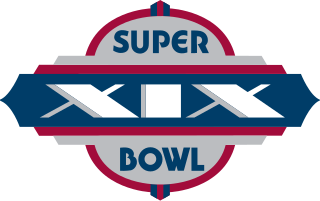
Super Bowl XIX was an American football game between the American Football Conference (AFC) champion Miami Dolphins and the National Football Conference (NFC) champion San Francisco 49ers to decide the National Football League (NFL) champion for the 1984 season. The 49ers defeated the Dolphins by the score of 38–16, to win their second Super Bowl. The game was played on January 20, 1985, at Stanford Stadium, on the campus of Stanford University in Stanford, California, the first Super Bowl played in the San Francisco Bay Area. This also became the second Super Bowl after Super Bowl XIV where the game was coincidentally played in the home market of one of the participants.
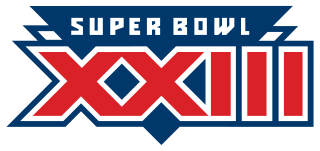
Super Bowl XXIII was an American football game between the American Football Conference (AFC) champion Cincinnati Bengals and the National Football Conference (NFC) champion San Francisco 49ers to decide the National Football League (NFL) champion for the 1988 season. The 49ers defeated the Bengals 20–16, winning their third Super Bowl. The game was played on January 22, 1989, at Joe Robbie Stadium in Miami. This was the first Super Bowl hosted in the Miami area in 10 years, and the first in Miami not held at the Orange Bowl.
The National Football League playoffs for the 1999 season began on January 8, 2000. The postseason tournament concluded with the St. Louis Rams defeating the Tennessee Titans in Super Bowl XXXIV, 23–16, on January 30, at the Georgia Dome in Atlanta.
The National Football League playoffs for the 1998 season began on January 2, 1999. The postseason tournament concluded with the Denver Broncos defeating the Atlanta Falcons in Super Bowl XXXIII, 34–19, on January 31, at Pro Player Stadium in Miami, Florida.
The National Football League playoffs for the 1994 season began on December 31, 1994. The postseason tournament concluded with the San Francisco 49ers defeating the San Diego Chargers in Super Bowl XXIX, 49–26, on January 29, 1995, at Joe Robbie Stadium in Miami, Florida.
The National Football League playoffs for the 1992 season began on January 2, 1993. The postseason tournament concluded with the Dallas Cowboys defeating the Buffalo Bills in Super Bowl XXVII, 52–17, on January 31, at the Rose Bowl in Pasadena, California.
The National Football League playoffs for the 1990 season began on January 5, 1991. The postseason tournament concluded with the New York Giants defeating the Buffalo Bills in Super Bowl XXV, 20–19, on January 27, at Tampa Stadium in Tampa, Florida.

The National Football League playoffs for the 1985 season began on December 28, 1985. The postseason tournament concluded with the Chicago Bears defeating the New England Patriots in Super Bowl XX, 46–10, on January 26, 1986, at the Louisiana Superdome in New Orleans, Louisiana.
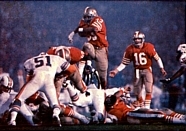
The National Football League playoffs for the 1984 season began on December 22, 1984. The postseason tournament concluded with the San Francisco 49ers defeating the Miami Dolphins in Super Bowl XIX, 38–16, on January 20, 1985, at Stanford Stadium in Stanford, California.

The Dolphins–Jets rivalry is a rivalry between the Miami Dolphins and the New York Jets in the National Football League (NFL). The teams both play in the AFC East division, and play two scheduled games each season as a result. They have often competed for divisional supremacy, and have played several classic games. Currently, the Dolphins lead the series 60–56–1, while the Dolphins have won the lone postseason meeting, defeating the Jets in the 1982 AFC Championship.
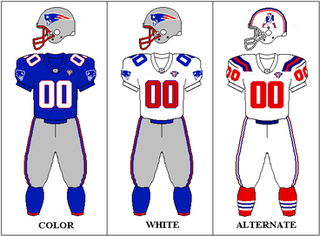
The 1994 New England Patriots season was the team's 35th season, and 25th in the National Football League (NFL). It was the first under owner Robert Kraft, who purchased the team after preventing previous owner James Orthwein from moving the Patriots to St. Louis. The Patriots finished the season with a record of ten wins and six losses, and finished tied for first in the AFC's East division.
The 1986 New York Jets season was the 27th season for the team and the seventeenth in the National Football League. It began with the team trying to improve upon its 11–5 record from 1985 and return to the playoffs under head coach Joe Walton. The Jets finished the season with a record of 10–6, qualifying for the top Wild Card spot in the playoffs despite losing their last five games of the season. They defeated the Kansas City Chiefs 35–15 in the wild-card round, but lost to the Cleveland Browns in the divisional round. The loss to the Browns is infamous in Jets history. Leading 20–10 in the 4th quarter, the Jets collapsed when Mark Gastineau hammered Browns quarterback Bernie Kosar seconds after he released a pass; Gastineau was flagged for roughing the passer and the Browns rallied to force overtime and win 23–20 early in the game's second overtime.
The 1993 Dallas Cowboys season was the franchise's 34th season in the National Football League (NFL) and was the fifth and final year of the franchise under head coach Jimmy Johnson. During Johnson's tenure, the Cowboys made two of their three Super Bowl appearances between 1992 and 1995 and won back-to-back Super Bowl titles. The season is notable for seeing the Cowboys become the first team to start 0–2 and still reach the Super Bowl. The following off-season was marked by the surprising resignation of Johnson, who departed the Cowboys due to a dispute with owner Jerry Jones about who deserved more credit for the back-to-back Super Bowl wins. This would be Johnson's last head coaching job until 1996, when he became the new head coach of the Miami Dolphins to replace the retiring Don Shula, who had served as their head coach since 1970.
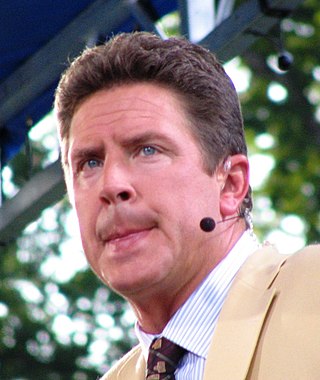
Daniel Constantine Marino Jr. is an American former football quarterback who played in the National Football League (NFL) for 17 seasons with the Miami Dolphins and currently works for the same team since 2014 as a special advisor. He played college football for the Pittsburgh Panthers, earning first-team All-American honors in 1981. Marino was the last quarterback taken in the first round of the famed quarterback class of 1983. He held or currently holds dozens of NFL records associated with the quarterback position, and despite never being on a Super Bowl-winning team, he is recognized among the greatest quarterbacks in American football history.
The 1994 Detroit Lions season was the 65th season in the National Football League (NFL). The Lions finished with a 9–7 record and made their second consecutive playoff appearance as one of the NFC's Wildcard teams—the first time the franchise had made the playoffs in consecutive non-strike seasons since 1954.
The 1983 Miami Dolphins season was the 18th season in football for the Miami Dolphins and they sought to return to the Super Bowl after losing to the Washington Redskins in Super Bowl XVII. It was also a turning point in the team's history, as in the 1983 NFL Draft a young quarterback slipped to deep in the opening round, being passed over by such teams as division rivals New York who drafted Ken O'Brien and New England who drafted Tony Eason. With the 27th pick, the Dolphins decided to take a chance on Dan Marino. In the draft's eighth round the Dolphins also selected receiver Mark Clayton.
The 2000 Miami Dolphins season was the franchise's 31st season in the National Football League, the 35th overall and was their first under new head coach Dave Wannstedt who was named the fourth head coach in franchise history on January 16, 2000, the same day that Jimmy Johnson announced his retirement from coaching. For the first season since 1982, Dan Marino was not on the opening day roster, as he announced his retirement prior to the season. Believed by many as the greatest Miami Dolphin of all time, Marino led the Dolphins to ten playoff appearances, one of which ended in Super Bowl XIX, and is the winningest quarterback to have not won a Super Bowl. Jay Fiedler, who left the Jacksonville Jaguars, succeeded Marino as starting quarterback. Damon Huard remained a backup quarterback and started for Fiedler in one game during the season.
The 1999 Miami Dolphins season was the team's 34th campaign, and 30th in the National Football League (NFL). It was the 17th and final season for Dolphins quarterback Dan Marino. Marino suffered an injury on October 17 against the New England Patriots, with Damon Huard taking over at quarterback. The team would go 4–1 under Huard, including a 17–0 victory over the Tennessee Titans. Marino would return on November 25, against the Dallas Cowboys, throwing five interceptions in the 20–0 loss.
The 1996 Miami Dolphins season was the team's 31st overall and 27th as a member of the National Football League (NFL). The Dolphins failed to improve upon their previous season's output of 9–7, winning only eight games. The team failed to qualify for the postseason.

The Clock Play was a famous trick play in American football, immortalized in what came to be known as the Fake Spike Game, played on November 27, 1994. The contest was played by the National Football League (NFL)'s Miami Dolphins and New York Jets that featured one of the most famous comeback plays in league history. Dolphins quarterback Dan Marino ran a trick play, pretending to stop the game clock but instead threw a pass that scored the game-winning touchdown, ultimately giving Miami the 28–24 victory.